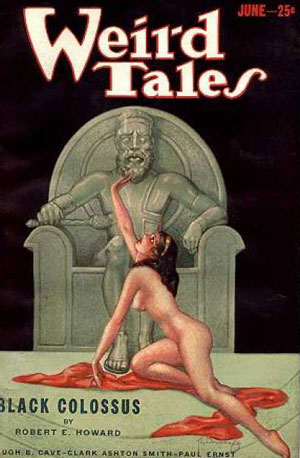Poison in the Well
Obviously, I never read the “Weird Tales” pulp magazine back in its glory days — or really, any other time, since it mostly hasn’t been published while I’ve been alive. But any fan of horror or weird fiction reveres it because it was one of the first magazines to publish authors like H.P. Lovecraft, Robert E. Howard, Robert Bloch, Clark Ashton Smith, Ray Bradbury, Fritz Leiber, Manly Wade Wellman, Theodore Sturgeon, C.L. Moore, and many others. It’s been revived periodically, mostly because the “Weird Tales” name and logo still carry a lot of weight for fantasy and horror fans, but the revivals have only rarely been successful or long-lasting.
The latest incarnation of the magazine seems to have screwed things up badly. It seems that the current publisher decided that the magazine’s connection to the past would be to the poisonous racism held by the pulp writers in the ’20s and ’30s…
Victoria Foyt’s self-published novel Revealing Eden: Save the Pearls Part One is set in a dystopian future where solar radiation means the Coals (with dark skin) can survive better than the fair-skinned Pearls. Pearls cover their white skin with dark make-up, and the black love interest of the 17-year-old white heroine Eden – shown in blackface make-up on the front cover and in promotional videos – is described as a “powerful, beastly manâ€. At one point, Foyt writes: “Eden flinched. One of them was touching her. White-hot light exploded in her head. Before she knew it, she blurted out an incendiary racial slur. ‘Get your hands off of me, you damn Coal!’â€
The novel has been the subject of widespread attacks across the internet, with readers criticising it as “incredibly racist to pretty much every reader. Especially readers of colourâ€, and as a “white supremacist fantasyâ€. “The coals/pearls contrast is itself offensive: after all, coal is dirty and cheap, whereas pearls are beautiful and valuable,†wrote one blogger. Some readers have said they are considering boycotting the magazine.
Foyt, who self-published Revealing Eden but has previously been published by HarperCollins, has defended herself on Facebook and in blog posts, saying that she “abhor[s] racismâ€, that the book has received many positive reviews, and “if you ask if all these reviewers are white then consider that you have a racist point of viewâ€.
Here’s some more info from the previous publisher and from an author whose first story was published in “Weird Tales.”
Obviously, it’s really sad to see a magazine with the pedigree of “Weird Tales” lower itself to publishing white-supremacist screeds, and to support them by publishing editorials claiming it isn’t racist, especially when it’s clear to everyone that the editor wrote it strictly as a cynical Cover-Your-Ass maneuver.
But it’s also part of an ongoing problem we’ve seen in the geek community — particularly in comics and gaming. Most of the recent controversies have been tied to the sexism and homophobia in the comics and gaming worlds, but the only reason that racism isn’t more noticeable is because the racism hasn’t been nearly as blatant as the sexism or homophobia.
The good news is, I think, that opposition to all the -isms in geek hobbies — sexism, racism, and homophobia in particular — is growing and becoming more vocal. It used to be that this kind of garbage was just accepted, but it isn’t anymore. Wanna publish a racist story in your magazine? Guess what — you’re going to get metric tons of angry letters about it. Wanna put rape fantasies in a Tomb Raider game? You’re going to get a ton of bad publicity about it. Wanna promote sexism in your comics? You’re going to be met at every convention by people who will call you out about it.
Doesn’t mean the struggle’s over — the struggle’s probably never over. It’s still important for people like us who hate getting our geekery mixed up with racism, sexism, homophobia, and other hatemongeries to keep speaking against hate. But from a business perspective, it’s becoming more clear all the time that the way to success means you have to avoid anything that’ll make you look like a hater. It’s a big, diverse marketplace out there, and you can’t make much money by excluding potential customers.

